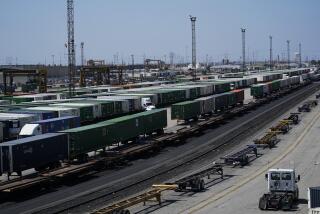EPA wants cuts in air pollution from ships
- Share via
The Environmental Protection Agency said Monday that it has submitted a proposal to the International Maritime Organization that would create tougher emission standards for foreign vessels in the coastal waters and ports of the United States and Canada.
The proposal would create a 230-mile Emissions Control Area along the nations’ coastlines as a “step to protect the air and water along our shores, and the health of the people in our coastal communities,” EPA Administrator Lisa Jackson said at a news conference in New Jersey.
The International Maritime Organization is the United Nations agency concerned with maritime safety and security and the prevention of pollution from ships.
The proposal could have a significant effect on air pollution in Southern California, where the Los Angeles and Long Beach port complex remains the region’s major source of carcinogenic diesel emissions.
Port authorities in Los Angeles and Long Beach endorsed the action. “It sounds to me like the EPA is rising up from the dead and beginning to live again,” said S. David Freeman, president of the Los Angeles Board of Harbor Commissioners. “In the meantime, we’ll continue to do things our way. We’ve gotten a lot done already, but if we can get help from the EPA, well, that’s a change for the better.”
However, foreign ships, which account for 95% of all calls to port nationwide, are largely beyond the jurisdictional reach of state and federal air pollution regulations. This plan would regulate the emissions of foreign vessels under the auspices of the U.N. agency.
The 360 ports along the Atlantic, the Great Lakes, the Gulf of Mexico and Pacific coasts drive both local and global economies, moving billions of dollars in raw materials and products, and creating thousands of jobs. Some of these ports, including the Los Angeles-Long Beach complex, are expecting to double their traffic in coming years.
Yet more than 40 U.S. ports in metropolitan areas fail to meet federal air quality standards, officials said. As a result, cities that rely on port and shipping industries tend to experience inordinately high rates of cancer, asthma and other illnesses, Jackson said. Under the proposal, beginning in 2011, nitrogen oxide emissions would be cut by 20% from vessels built since 1990. By 2016, new engines would see a cut of 80%. By 2015, sulfur emissions from fuel would be cut 95%, and small particulate matter by 85%.
“EPA’s announcement today is music to my ears because it means the United States is stepping forward to take a strong leadership role on clean air around ports,” Sen. Barbara Boxer (D-Calif.), chairwoman of the Senate Committee on Environment and Public Works, said.
EPA spokeswoman Cathy Milbourn said the U.N. agency would begin reviewing the proposal in July.
--
More to Read
Sign up for Essential California
The most important California stories and recommendations in your inbox every morning.
You may occasionally receive promotional content from the Los Angeles Times.











